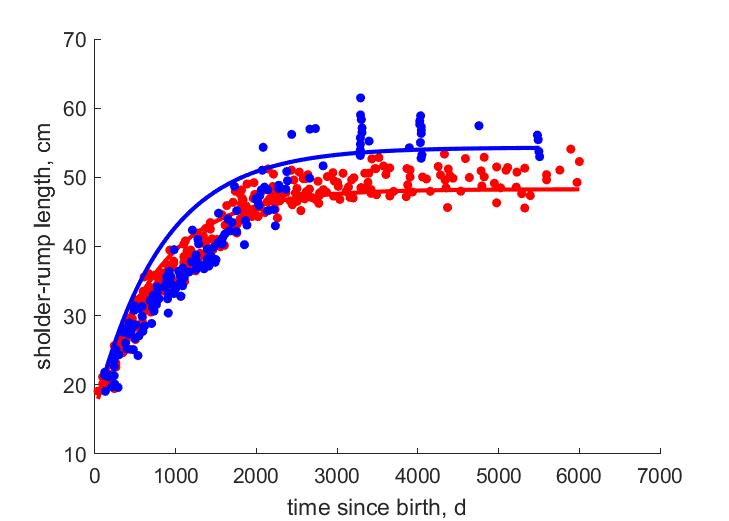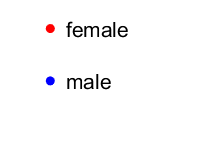Predictions & Data for this entry
| Model: stx | climate: Cwb | migrate: | phylum: |
| COMPLETE = 2.5 | ecozone: TPa | food: bxM, xiHl | class: |
| MRE = 0.045 | habitat: 0iTa, 0iTg | gender: Dg | order: |
| SMSE = 0.004 | embryo: Tv | reprod: O | family: |
Zero-variate data
| Data | Observed | Predicted | (RE) | Unit | Description | Reference |
|---|---|---|---|---|---|---|
| tg | 168 | 164.8 | (0.01885) | d | gestation time | AnAge |
| tx | 511 | 535.5 | (0.04801) | d | time since birth at weaning | AnAge |
| tp | 1606 | 1559 | (0.02913) | d | time since birth at puberty | LuBerg2016 |
| tpm | 2190 | 2197 | (0.003023) | d | time since birth at puberty | LuBerg2016 |
| am | 1.314e+04 | 1.307e+04 | (0.005325) | d | life span | AnAge |
| Lb | 18 | 16.44 | (0.08679) | cm | sholder-rump length at birth | LuBerg2016 |
| Lx | 28.8 | 32.3 | (0.1215) | cm | sholder-rump length at weaning | LuBerg2016 |
| Lp | 43.5 | 44 | (0.01149) | cm | sholder-rump length at puberty | LuBerg2016 |
| Lpm | 48.5 | 45.83 | (0.05495) | cm | sholder-rump length at puberty for males | LuBerg2016 |
| Li | 49 | 48.28 | (0.01474) | cm | ultimate sholder-rump length | LuBerg2016 |
| Lim | 56.3 | 54.32 | (0.03524) | cm | ultimate sholder-rump length form males | LuBerg2016 |
| Wwb | 464 | 472 | (0.01724) | g | wet weight at birth | AnAge |
| Wwx | 3900 | 3581 | (0.08191) | g | wet weight at weaning | AnAge |
| Wwi | 1.1e+04 | 1.196e+04 | (0.08706) | g | ultimate wet weight for female | Wiki |
| Wwim | 1.85e+04 | 1.846e+04 | (0.002383) | g | ultimate wet weight for male | Wiki |
| Ri | 0.00137 | 0.001345 | (0.018) | #/d | maximum reprod rate | AnAge |
Uni- and bivariate data
| Data | Figure | Independent variable | Dependent variable | (RE) | Reference |
|---|---|---|---|---|---|
| tL_f |   | time since birth | sholder-rump length | (0.0477) | LuBerg2016 |
| tL_m |   | time since birth | sholder-rump length | (0.1305) | LuBerg2016 |
Pseudo-data at Tref = 20°C
| Data | Generalised animal | Theropithecus gelada | Unit | Description |
|---|---|---|---|---|
| v | 0.02 | 0.0202 | cm/d | energy conductance |
| kap | 0.8 | 0.9258 | - | allocation fraction to soma |
| kap_R | 0.95 | 0.95 | - | reproduction efficiency |
| p_M | 18 | 16.58 | J/d.cm^3 | vol-spec som maint |
| k_J | 0.002 | 0.002 | 1/d | maturity maint rate coefficient |
| kap_G | 0.8 | 0.7999 | - | growth efficiency |
| t_0 | 0 | 0.01935 | d | time at start development |
Discussion
- Males are assumed to differ from females by {p_Am} only
- mod_1: males have equal state variables at b, compared to females
Facts
- Almost exclusively graminivorous; only primate that eats grass (Ref: primate)
Bibliography